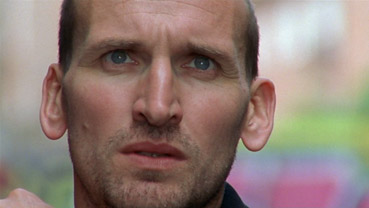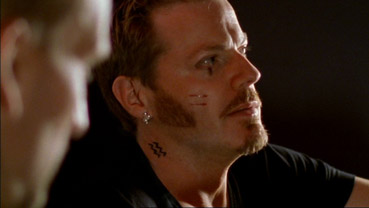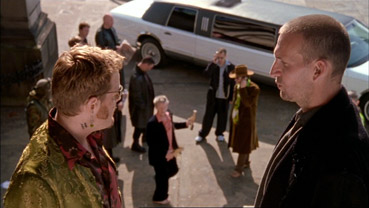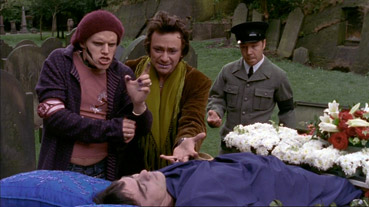|
"Let
the man who seeks revenge remember to dig two graves."
When
Baz Luhmann updated William Shakespeare's Romeo and
Juliet to a modern, multi-cultural, alternate reality
gangland America, the press coverage, reviews and public
response were overwhelming. Last year, Alex Cox took
Thomas Middleton's* A Revenger's Tragedy and updated
it to a futuristic, alternate-reality gangland Liverpool and the
silence was deafening. There are a number of obvious reasons
for this: Christopher Eccleston is not quite as big a babe magnet
as Leonardo De Caprio; Baz Luhmann was hot property
after the sleeper hit Strictly Ballroom and few people could even name Alex Cox's last three films;
Luhmann employed all the visual and aural pazaz of music
videos, while Cox took a more low key and understated approach.
And you can't underestimate the power of a famous brand
name – you may or may not have read any of Shakespeare's plays,
but you've certainly heard of their author. But Thomas Middleton?
And the very names Romeo and Juliet have transcended the
original play to become part of our language. But A
Revenger's Tragedy? Huh? On top of that, Luhmann's
film had a big budget and king-sized American studio backing while Cox's had minimal funding and was distributed by British
independent Metro Tartan. Of course, some will tell you that
the real reason is that Romeo + Juliet
was a great movie and Revenger's Tragedy
is a dud. I am here to tell you that this is nonsense of
the lowest order. Revenger's Tragedy is
not just a terrific adaptation of the play and Cox's
finest work since his auspicious 1984 debut Repo
Man, but also one of the most refreshingly inventive
and enjoyable films to come out of anywhere last year.
The
year is 2011, and in a post-apocalyptic Britain, southern
England now lies underwater, while Liverpool is suffering
under the weight of urban decay and gang warfare. Ten years
after his wife was murdered on their wedding day, exiled
outsider Vindici returns to the city, his intention being take revenge against her killer, a lecherous, all-powerful city
ruler known as The Duke. On arriving in Liverpool, Vindici re-unites
with his estranged brother and sister, and on meeting and
ingratiating himself with the Duke's eldest son and heir,
Lussurioso, he makes his first moves to bring down not just
The Duke, but his entire family.

An
update of a 1607 Jacobean tragi-comedy inevitably creates
expectations of a classical approach, something Cox and
screenwriter Frank Cottrell Boyce (whose previous credits
include Welcome to Sarajevo, Hilary
and Jackie and 24 Hour Party People)
dispel wonderfully in two brief opening scenes. Vindici
arrives in Liverpool as the only living passenger on a
bus of death, which lumbers to a halt half-full of decaying
bodies and digital flies in what looks almost like a deleted scene from Danny Boyle's post-apocalyptic thriller 28
Days Later. A short while later, Vindici is striding
purposefully down the street when he is confronted by a
local youth gang. His attempt to ignore them fails and
in the space of ten seconds he has floored half of their number and scared the others off. Five minutes in and the film
has flirted with horror, science fiction and action cinema.
More crucially, Cox has effectively sketched the social
situation and a key element of his central character. The arrival
of the bus and broken street signs show a society and city
in decay, the yellowed sky suggesting a drastic environmental
change, the empty streets a severely reduced population,
while the splendidly choreographed punch-up presents Vindici
as a man of considerable strength, skill and determination, and
definite not someone you don't want to mess with.
As
with Romeo + Juliet, much of the original
dialogue has been retained, but thrown into the mix is the odd
contemporary line that, while often comical, never seems inappropriate or out
of place. After the wrong brother has been killed, for instance, two of
the Duke's scheming sons vent their anger at the situation
and the officer charged with handling the funeral, who has
been waiting patiently for a tip. As one brother threatens
the waiting officer in classic style, "Villain, I'll
kill thee!" the officer disdainfully responds, "Fuck
off, you cheap pair of bastards." However this reads,
it works wonderfully on screen, especially in the company of a large
and receptive audience. This approach is most amusingly
effective in a brief aside in which two knaves have a heated
and eventually violent discussion about possible Kennedy-style
conspiracy theories surrounding an assassination in a reflection of one of Cox's own particular passions. These comic
moments are balanced nicely with the drama and always seem
in-keeping with the spirit of the original play, which had
the nerve to name key characters Ambitioso, Spurio, Supervacuo
and Sordido, and contained scenes every bit as absurd as
anything Cox puts on screen. (In one memorable sequence not included in the film, an officer is chased away by Supervacuo, who
is brandishing the decapitated head of his dead brother
and threatening to "brain thee with it!")
If
Middleton's dialogue rarely approaches the poetry of Shakespeare
on form and his plotting is less intricate,
then many of the pleasures are nonetheless similar, particularly the use of language
and the abandonment of modern-day moralities by characters
driven by base emotions. There is also
a wonderfully subversive streak running through the narrative
that Cox gleefully builds on, resulting in some very nicely
done digs at the public outpouring of grief over the death
of Diana Spencer and the betrayal of working class principles
by the New Labour of Tony Blair and his ilk (The Duke's
main rival is played by Blair's father-in-law Anthony Booth,
a character who, on rising to power, continues the oppressive
policies of his predecessor – ring any bells?). The film
notes that are included in the accompanying booklet suggest
Cox wanted to take this much further, with a closing montage
of the September 11th twin towers collapse in New York and
Vindici, skull in hand, whispering "Revenge...Revenge..."

The
narrative unfolds compellingly, with flashbacks to the event
that triggered Vindici's lust for revenge worked smoothly
into its structure, while individual scenes – such as Vindici
testing his blind mother's integrity – are genuinely
gripping in their use of dialogue, performance, camera placement
and even ambient sound. There is a driving energy running
throughout the film, a sense that everyone involved is pulling
together and infused with the same sense of excitement about
the material. This is also true of the music score, composed
for the film by anarchist rock group Chumbawamba, previously
best known for the ludicrously catchy Tubthumping single and for throwing a bucket of water on John Prescott
when he was trying to show how in touch with the kids
he was at the 1998 Brit Awards. They contribute to one of
the film's nicest gags with a very recognisable riff that
always (and only) accompanies a shot of Lussurioso riding
in the back of the family limo with his brothers – every
time the music and the shot appears, he is one brother fewer
until he is left, rather contentedly, with the car to himself
(a contentment that is shattered when Vindici pops cheerily
and unexpectedly in to join him).
Even
updated classical theatre demands strong performances, and
Cox has assembled a fascinating cast here, employing what feels like every
well known contemporary Liverpudlian character actor in
the supporting roles, almost all of whom are on fine form.
But it's with his leading players that he really scores. Christopher
Eccleston is an absolute joy as Vindici, making every single
word and gesture count, sometimes through the exaggerated
movements of a man on the edge, and often with extraordinary
and sudden metamorphoses from one emotion or intention to
another. Approaching the Duke with the intention of stabbing
him, for example, he is caught out by the sudden appearance of bodyguards
and the Duke's recognition of him as a man who procured
a woman for his son, a service he now requests for himself –
Eccleston's fiery anger in a second breaks into the widest
of accommodating smiles, as an opportunity for more appropriate
vengeance unexpectedly registers. Even his determined and
purposeful stride exerts a force that feels at times almost unstoppable.
Indeed, it is Eccleston's animated immersion into the role
that has repeatedly sent me back to key sequences of the
film.
As
the Duke's son and heir Lussurioso, comedian turned actor
Eddie Izzard for the first time shakes off the impression
that he is playing, well, Eddie Izzard. His ambition, seriousness
and contempt for his oafish brothers is nicely conveyed,
and the scenes between him and Eccleston have a very real
spark about them. As The Duke, Derek Jacobi has almost a
secondary role, and with his long white hair and dark glasses
sometimes seems coldly detached from the narrative, but
that's the nature of the character, and when he has to he
explodes into life he radiates a genuine aura
of power and malice. Many of the
supporting players, including familiar faces Andrew Schofield
and Margi Clarke, also make their mark, and my only real
reservation is the presentation of Lussurioso's brothers,
a mixture of mad facial piercing and cartoonish campness
that results in crude one-dimensional characters who are designed, it
would seem, for us to cheer for the deaths of without moral complication.
Oh, and that's Alex Cox himself as The Duke's chauffeur.

Revenger's
Tragedy was one of may favourite films of last
year and repeated DVD viewings have failed to alter that
view a fraction. It seems ludicrous that when terrible Hollywood
movies can find a sizeable audience and a wide cinema release,
one of the best British films in years remains ridiculously
unseen in the very country in which it was made. Well now
it's out on DVD there's no excuse – hunt it out and revel
in the past glories of Thomas Middleton, and the present
ones of Alex Cox and his talented collaborators.
How
times change. Once there was an extreme nervousness that
accompanied the mere placing of a Tartan disk in the DVD
tray – memories of Ringu, Hard
Boiled and Audition still haunt
me – but in recent times we have seen some first rate transfers
from the distributor, and in terms of picture this is another
example of the quality we have now come to expect. There is some minor film grain evident, and for the most part it is fault free – crisp, with excellent colour rendition,
near-perfect contrast and rock-solid black levels. A low
budget enterprise this may have been, but with Len Gowing's
splendid lighting and Cecilia Montiel's lively production
design reproduced so well here, it never looks it.
Oh,
if ever a film needed a 5.1 soundtrack and doesn't get it,
then Revenger's Tragedy is it. The use
of ambient and atmospheric sound and Cumbawamba's moody,
sometimes driving score need to fill the room, not be spread
across the front sound stage, bypassing the might of the
subwoofer. It's a decent mix, nonetheless, and dialogue
in particular is always clear (a necessity considering its
nature). If you have a decent DSP mode on your amp, then
my advice is to kick it in, as the difference is startling
– music fills the room, and bass notes, punches and thunder
reverberate through your chest. Of course, it should have
done this anyway, and a proper 5.1 mix is still sorely missed.
What
I really wanted to see here was a cast and crew commentary,
but I always want that. There are extras, but they
are a little thin.
Seeking
Revenge: On-Set Documentary is 16:9 anamorphic
and Dolby 2.0 and not the in-depth look at the making of
the film that this title suggests, but a pretty standard,
10 minute EPK. It combines clips of the film with shots
of the cast and crew at work and brief interviews with director
Cox, producer Tod Davies and key members of the cast. Expected
communal back-slapping aside, this still gives a reasonable
intro to the production, but more depth would have been
welcome. And the interview with Cox is out of focus.

Rehearsal
Footage
is a virtually formless collection of 16:9 DV footage of
the actors rehearsing for three scenes of the shoot, plus
some moments of Cox working with his cast and crew. Lack
of structure aside, it's still pretty interesting for the
midsection showing the shooting of the opening fight sequence,
but again, more would have been nice, as would some commentary
on what we do have.
The
Original Theatrical Trailer is
non-anamorphic 16:9 and Dolby 2.0 and runs for 1 minute
33 seconds. Interestingly, it contains only a couple of
single words of dialogue, possibly reflecting a fear on
the part of the distributor that a potential audience would
be frightened off by Jacobean language (this same trick
is used a lot by American distributors when handling foreign
language films).
Finally
we have the World Cinema Trailer Reel, which has
trailers for other Tartan releases, L.I.E.,
Safe, Ivansxtc, Secretary,
My Kingdom and Irreversible.
These are in a variety of aspect ratios, with only Ivansxtc
and Irreversible being anamorphic.
This
is the film I have been waiting for Cox to make for years.
Having launched his career so auspiciously with Repo
Man and followed it up so well with Sid
and Nancy, I found it hard to believe that Straight
to Hell and Walker, for all their offbeat pleasures, were a signpost for all future Cox projects. For his first UK-shot
film (that alone seems insane) Cox has found the right material,
the right screenwriter, and the right cast for his quirky but
considerable talent, and has directed one of the most enjoyable
films of last year, as well as one with a genuine national
and local identity. Tartan's DVD lacks much in the way of
extras, and sorely needs a 5.1 sound mix, but I can't fault
the picture quality and that alone makes this worth buying.
The film will doubtless have its detractors, but quite frankly
I care not – a poxxe upon them all!
* Actually the play is credited to Cyril
Tournier but it's generally agreed that Middleton was the
real author.
|